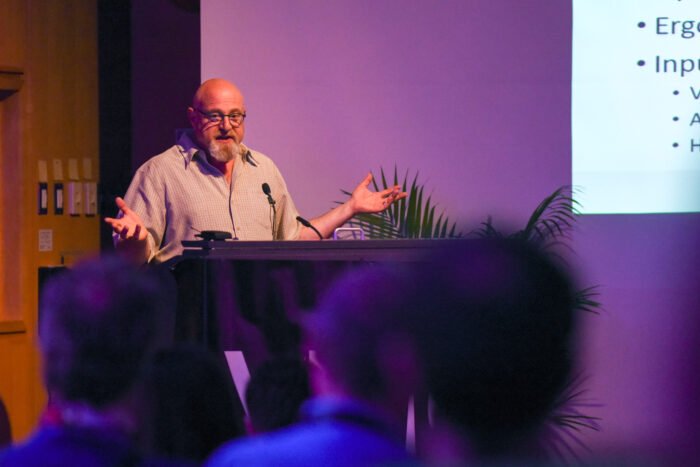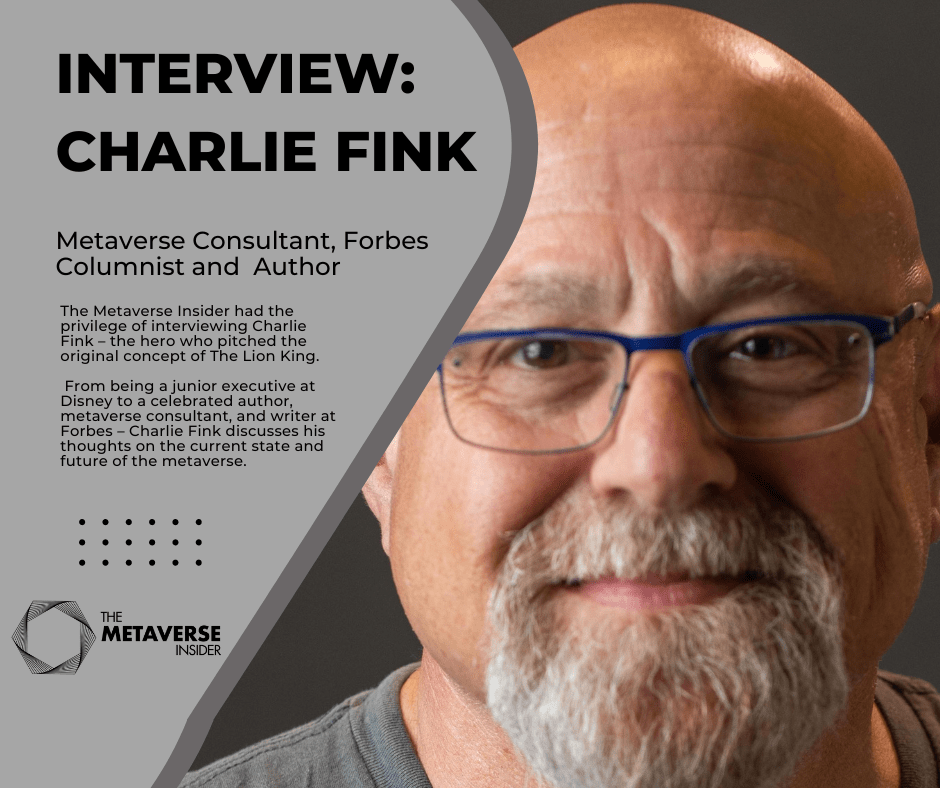The Metaverse Insider had the privilege of interviewing Charlie Fink – the hero who pitched the original concept of The Lion King. From being a junior executive at Disney to a celebrated author, metaverse consultant, and writer at Forbes – Charlie Fink discusses his thoughts on the current state and future of the metaverse.
Charlie Fink re-entered the tech world with heavy involvement in VR during the nineties. In writing four books concerning AR and VR from 2017, to writing in the weekly Forbes column ‘This Week in XR’ and co-hosting its eponymous companion podcast – Charlie Fink is now a certified metaverse guru.
Charlie Fink’s career in business, outside of AOL and entertainment, has been tremendously applicable in this growing field; with the technology maturing, there are many questions concerning what we do with it and how to prevent ourselves from repeating the same mistakes when developing the original asynchronous intranet. Charlie Fink addresses the use cases of VR in the metaverse:

“The consensus view at the moment is that VR is not a condition for the metaverse – the only company that thinks that is the self-interested company formally known as Facebook.”

With Facebook’s rebranding to Meta and acquisition of Oculus, Charlie Fink speculates whether the hype surrounding a VR-orientated metaverse would otherwise still be present. By a common definition of the metaverse comprising of “3D virtual connected 3D virtual worlds”, we are left to contemplate the current need for VR:
“While VR may offer a compelling way to view these 3D worlds, it will not be the primary way, and 320 million Fortnite players say so.”
Charlie Fink further addresses that with Mark Zuckerberg building the Oasis from Ready Player One, there is no reason that this will not succeed to some degree. However, there are many issues:
“The locomotion issue is real, and everybody worldwide will not be on a virtual treadmill. The VR from Ready Player One isn’t necessarily going to be that great. You know, VR has problems. It continues to have problems – fast-paced games and things that have even the slightest bit of latency can affect us.”
With there being significant friction surrounding VR in this space, Charlie Fink also discusses his thoughts on the interchangeable terminology of the metaverse:
“Everybody is calling the metaverse web3 because they don’t want to say Meta, and they’re not talking about decentralized apps – That’s one thing that I find annoying. I hate it when people use appropriate language for their purposes. Certainly, we’re not going to be calling it the metaverse in 10 years, any more than we call the internet the worldwide web.”
With Charlie Fink stating that these arguments are irrelevant in the long-term, a greater emphasis is placed on decentralization; is this really what the concept of 3D connected virtual worlds need?
“Connected virtual worlds may want centralization the same way cable channel ownership wants centralization. The goal of decentralization is a good thing, but it would have a very high price that I suspect most people don’t want to pay”.
Much discussion has concerned using cryptocurrency as a currency for the metaverse. However, Fink emphasizes that this “is not a done deal.” With the abundance of companies like Visa, which are all up in this business – they are most likely going to win the situation; “Visa has the edge over cryptocurrency. The crypto transaction fee is too high.”
Being in the early stages of the metaverse, it is easy to say we are in the year 1993 of the internet. Without having adequate online services aside from Oculus, Charlie Fink states that we need more:
“Oculus is our first online service, but there’s no Google. We have no DW Griffith making entertainment. Although, I am convinced that the next Steven Spielberg will be a world builder.”
In the light of new technology, many families have experienced changes in their relationships; smartphones and games have allowed people to be infinitely available yet rarely fully present. With the pandemic, Charlie Fink mentions how the gaming industry grabbed the bull by the horns:
“I think what we see here with the metaverse is the gamification, if you will, of the internet. We’re certainly seeing it in Hollywood, where game and movie production techniques are combined. Those are the trends that are going to determine the world that we live in, but also the jobs of the future”

Finally, The Metaverse Insider asked Charlie Fink how he would describe the metaverse in the next ten years:
‘Connected 3D virtual worlds will get highly nuanced. Do they have a creator economy? Are they transactional? Is it free?‘
“The real infrastructure we need for the kind of metaverse people are talking about is a way away, but we will have workarounds, and you’ll have places like Fortnite, second life, and sandbox.”
“But where will we be in 10 years? Well, I don’t know, probably 300 million VR headsets worldwide.”
“I don’t think ten years is that long of a time. But do I believe in 20 years, people will have AR glasses? I don’t know. We may not. We may skip that stage. We may end up going to contacts or other kinds of brain-computer interfaces.”
“Everything that’s made of atoms is going to be turned into bits, and everything we can do in the physical world, we can do in the virtual world. Will people prefer to do it that way? Well, some people will have to do it that way.”
For more market insights, check out our latest Digital Twin news here.













